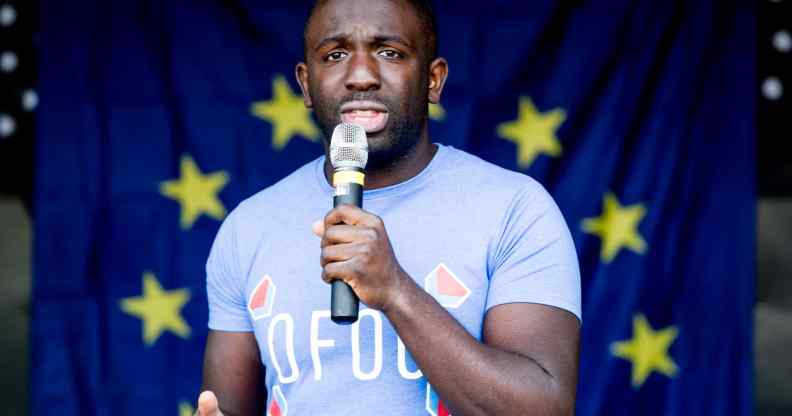Political activist Femi Oluwole questions why BBC presenters can wear poppies if they can’t support Black or gay rights

Pro-EU campaigner Femi Oluwole. (Ollie Millington/Getty Images)
British political activist Femi Oluwole sought to challenge new BBC guidance that bars news journalists from flagging their support for Black Lives Matter or LGBT+ rights – but allows them to wear poppies.
Last week, the BBC was belaboured for introducing rules warning staffers off “virtue signalling, no matter how worthy the cause”, and banning them from attending political protests – but not, as it hastily clarified following reports to the contrary, Pride marches.
Soon after the corporation clarified that under the new rules remembrance poppies would still be allowed, “provided they embrace the simple act of remembrance and do not carry a political or campaigning or commercial message”.
Appearing on Jeremy Vine Tuesday morning (November 3), Oluwole, co-founder of the pro-European Union advocacy group Our Future Our Choice, questioned why wearing a poppy is considered a “moral absolute that cannot be questioned” when “the same not the case for racial equality [and LGBT+ rights]”.
His appearance on the daytime talk show followed a series of tweets Monday (November 2), in which Oluwole asked the BBC: “Why are your presenters wearing poppies?
“Your rules ban ‘virtue-signalling, no matter how worthy of the cause’.
“If presenters can support war-related campaigns on the news, surely they can show they believe in quality for Black and gay people? Or is this against BBC values?”
Dear @bbc,
Why are your presenters wearing poppies?
Your rules ban "virtue signalling no matter how worthy the cause".
If presenters can support war-related campaigns on the news, surely they can show they believe in equality for black & gay people? Or is that against BBC values? pic.twitter.com/OTjcGHgc7C
— Femi (@Femi_Sorry) November 2, 2020
Femi Oluwole: ‘If you’re going to call Black Lives Matter and LGBT+ rights “virtue-signalling”, why is wearing a poppy any different?’
Oluwole stressed that he is in no way saying that presenters and other public figures should not wear clip poppies on-air – but if they are allowed to do so, why not a similar sign of support for Pride or Black Lives Matter?
Twitter immediately bristled with tension, ratcheted up further by Oluwole’s stint on Jeremy Vine which saw him clash with Carole Malone, a television presenter known for her provocative comments.
Malone argued that the poppy is “not a moral absolute” and accused Oluwole of politicising it.
“No one in this country is forced to wear a poppy,” she said, “they wear it if they want to and they wear it for a specific reason.”
Oluwole quickly clarified that is in no way “criticising or questioning” people wearing the symbol.
“People on Twitter think you’re criticising it,” Malone said.
“People on Twitter have never been wrong before!” Oluwole remarked.
“I am equating [poppies] with the push for racial equality and the push for the rights of gay people. I’m saying that if you’re going to call those things ‘virtue-signalling’, why is wearing a poppy any different?”
“Virtue-signalling” is a phrase coined by right-wing communities for so-called feigned righteousness intended to make the speaker appear superior by condemning others. The term has often been weaponised by conservative figures as a way to make real, pointed criticisms appear disingenuous.
Oluwole’s remarks divided Twitter. Addressing criticisms, the 30-year-old tweeted: “I’m so sorry, everyone.
“I now understand that believing in Black people and gay people have rights is too much of a controversial political opinion to be compared to wearing a poppy… My bad.”
I'm so sorry everyone.
I now understand that believing black and gay people have rights is too much of a controversial political opinion to be compared to wearing a poppy… My bad.— Femi (@Femi_Sorry) November 3, 2020

